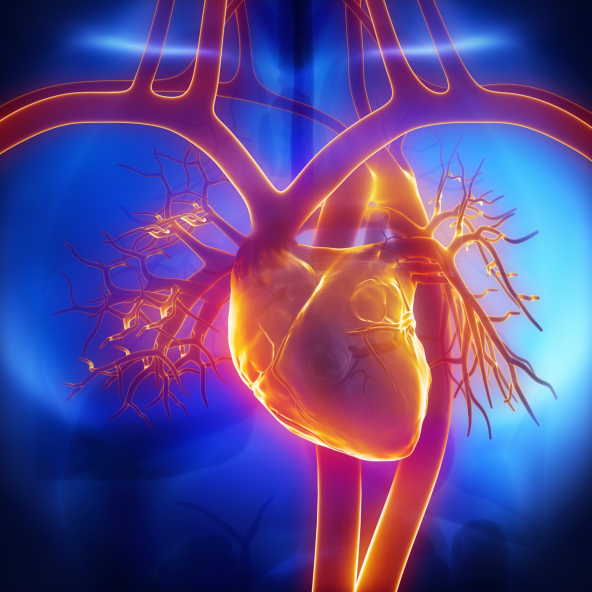Subclinical hypothyroidism is defined as having a high TSH (the test which indicates low thyroid levels), accompanied by a normal thyroid hormone. Many consider it to signify the early stage of thyroid dysfunction, although it’s not widely accepted by conventional medicine. Wilson’s Temperature Syndrome (WTS) has similarities to subclinical hypothyroidism, but uses low body temperature as the primary sign; like WTS, there is controversy about using thyroid hormone to treat subclinical hypothyroidism.
It is important to identify cases of subclinical hypothyroidism, as it has been associated with a higher risk of developing cardiovascular disease. A recent paper reviewed many studies which support this correlation. One large study (the Rotterdam study), found that 10% of the participants had subclinical hypothyroidism, and they were shown to have a higher risk of atherosclerosis and myocardial infarction (heart attack) than the people with normal thyroid. Another study showed that participants with subclinical hypothyroidism had a significantly higher risk of developing coronary artery disease (CAD), a narrowing of the blood vessels which serve the heart, as compared to participants with normal thyroid tests. Another study showed a higher mortality rate due to cardiovascular disease in patients with subclinical hypothyroidism as compared to those with normal thyroid tests. It was significant that this study also showed in a 20 year follow up, that when subclinical hypothyroidism was resolved by thyroid hormone treatment, the risk of cardiovascular disease and mortality diminished.
In a published meta-analysis which included 11 studies, it was shown that as TSH levels increased, so did the risk of CAD events and mortality; the highest risk was for those with a TSH level greater than 10 mlU/L.
It’s not well-understood how or why there is a link between subclinical hypothyroidism and cardiovascular disease, but several mechanisms were proposed. There is a theory that high TSH causes endothelial (blood vessel lining) dysfunction and inflammation, setting the stage for atherosclerosis and CAD. There are various theories as to why this occurs, such as higher blood thrombogenicity and increased angiogenesis due to elevated TSH.
A review of the research on heart failure shows that subclinical hypothyroidism is associated with a greater risk of heart failure, due to left ventricular dysfunction. Several studies showed that subclinical hypothyroidism increases the risk for cardiovascular disease, and patients who have heart attacks or heart failure, accompanied by a high TSH, have a greater risk of mortality.
High cholesterol is known to be linked to hypothyroidism due to several factors, but it can be reversed by thyroid hormone treatment. Subclinical hypothyroidism has been shown to have a similar, although weaker correlation to elevated cholesterol levels. It’s also been shown to be linked to hypertension.
Although not entirely proven, it appears from this extensive review of the literature that treating subclinical hypothyroidism is important from the perspective of preventing cardiovascular disease and reducing the risk of mortality. It is possible that there may be a similar correlation between Wilson’s Temperature Syndrome and cardiovascular risks, and therefore WTS should not be left untreated. Because thyroid function affects many cardiovascular parameters, it’s important to address any signs of dysfunction in order to optimize wellness and longevity.
Reference:
Antonis A. Manolis DPT, MS , Theodora A. Manolis MD , Helen Melita MD , Antonis S. Manolis MD , Subclinical Thyroid Dysfunction and Cardiovascular Consequences: An Alarming Wake-up Call?, Trends in Cardiovascular Medicine (2019), doi:https://doi.org/10.1016/j.tcm.2019.02.011


It is not subClincal, but just that blood tests don’t work to tell the truth about health. TSH should not be used. Gluten may hurt the pituitary which makes TSH and the thyroid and more. They should give thyroid medicine by symptoms not blood tests. Most people maybe getting too low a dose of thyroid medicine which keeps them sick. Trump is getting Statin drugs instead of Amour thyroid which can lower cholesterol. Statin drugs can cause heart failure as coenzyme Q10 (spark plug to the mitochondria..engines of the cells) production in the liver is blocked by the Statin drug. Low thyroid may let the heart enlarge and adrenal have to work harder. Vit K2 may remove Ca from blood vessels and put it into the bones. Fish oil thins blood. Carnitine may help fatty acids get into the heart. Gluten may cause heart disease/thyroid issues. Gluten can hurt glands and hurt the gut lining so less nutrients absorb…then cells are not made right to work right. People need more than thyroid medicine, but no gluten may stop attacks on the thyroid/gut lining. Low sunlight/Vit D3 may cause autoimmune attacks on the thyroid/gut lining/brain/glands etc.by gluten. GMO may also hurt the gut lining. Antioxidants may prevent ulcers in blood vessels that Ca plaques form on.
MS people may not get thyroid medicine and are in a wheel chair. They got Statin drugs/antidepression medicine/cooling suits/air conditioning instead. Low thyroid people may not sweat well/have nigher cholesterol and have low oxygen in the brain which may cause depression. My relative doesn’t have thyroid medicine and now her heart is enlarged.